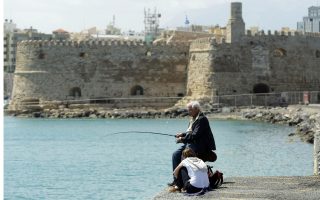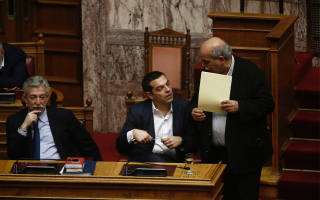Studying the insignificant

When encountering a new country and its culture, I adopt two strategies: I visit the markets and I read the fiction. The markets tell me not only the cost of living but also the quality of people’s lives. The books tell me the same about the marketplace of their minds: the price people are willing to pay for life and the values they put on those lives.
From the time of Alexandros Papadiamantis onward, writers have chronicled the small-scale in order to illuminate the big picture. Odysseas Elytis said, “You will come to learn a great deal if you study the insignificant in depth.” I suppose this is because the way Greeks think about their society and how it should – or shouldn’t – be organized is based on the home, the family, the closed community where the rules of domesticity (literally, the economy) are worked out and either obeyed or transgressed.
Before compulsory dowries were abolished Papadiamantis’s “The Murderess” was a cautionary tale about the tragic fate of young girls. Perhaps it still is. So too is Sotiris Dimitriou’s “May Your Name Be Blessed,” if the shifting of Balkan borders continues. So too is “Fool’s Gold,” Maro Douka’s account of ideological rejection of fascism. So too is “The Beggar,” Andreas Karkavitsas’s 1896 analysis of tax evasion and graft.
None of the fears, anxieties or hopes expressed in these works has been removed by “progress” but in many cases they’ve been intensified by the tensions between the traditional pieties and the modern, mostly Western, criteria for success.
But there is one major problem for the “xenos” (foreigner/stranger): All the books I’m mentioning are available in English translation, which is how they come to my eye. But they are the tip of the volcano and it is shameful that the agency for funding translation was closed: Austerity should impel more cultural activity, not less. The Greek voice needs to be heard in the international marketplace, along with its wines, its olive oils and its robotics.
Greek writers are predestined to write detective thrillers. As the splendidly iconoclastic Christos Chryssopoulos says, “The writer ‘suspects’ relationships between things, notions, people and ideas,” which an investigator into corrupt practices might be discouraged from seeing. So we find it in the recent stories of Petros Markaris’s Inspector Charitos or Leo Kanaris’s private eye George Zafiris. The contemporary Greece we meet every day in the media becomes only slightly fictionalized in their work. When I read about a senior political official being accused of asking drug company Novartis for a suitcase of money to be delivered to the Maximos Mansion, I don’t need a novelist, and if a novelist wrote it, we wouldn’t believe it.
A dominant, outward-going nation tells its stories from a position of strength and confidence; its public and private narratives establish images and traditions of orthodoxy, success and rootedness. A colonized, subdued nation tells stories of failure and embarrassment, creating images of hope and despair which are future-oriented. So nations tell their stories differently before and after freedom. They see the world through different ends of the telescope.
When freedom comes, men and women explore each other in a new light, as citizens and as lovers, but above all they explore freedom itself. Attitudes to land, society and sexuality take on new perspectives and are subject to new descriptions. Narratives alter both subtly and violently.
But contemporary British writing has run out of things to say, and writers like Martin Amis or Julian Barnes have to incestuously borrow each other’s preoccupations: “Buddy, can you spare a paradigm?” Greek writers don’t have to do this. There are assumptions in Greek literature which are continuously challenged by socioeconomic factors. There are exciting dynamics of literature in a newly born state and, judging by Greece’s writers over the past 150 years, Greek society is developing in ways that are not faithfully portrayed in the history books.
Sophia Nikolaidou says: “A novel is written in the free space where History and human stories meet. Literature reflects what could have happened. History is credited with truth (if there is such thing in our world) and literature with verisimilitude (‘alithofaneia’).” But there are dangerous moments when history and truth don’t coincide, as she shows in her novel “The Scapegoat.”
Is a writer necessarily a witness to history? Panos Karnezis says: “Writers keep declining the responsibility of being spokespersons for this or that ethnicity, religion, social class or sexual orientation. A writer’s opinions represent only their own.”
It’s little wonder that Prime Minister Alexis Tsipras considered Ioanna Karystiani as a presidential candidate: The author of the socially realistic “Back to Delphi” (Ta Sakia) happens also to be wife of Pantelis Voulgaris, director of the disturbing civil war film “Psyhi Vathia.”
As Ersi Sotiropoulos said last year: “One of the recurrent questions of foreign journalists, since the crisis began, has been: What is the role of the writer? What can writers do in time of crisis? What is their social responsibility? Silly questions. Very silly. What interests me is to see how, besides its catastrophic impact on people’s lives, the financial crisis has been corroded by a deeper crisis, an existential, ethical emergency, and how menacing those small symptoms can become, that at a first glance seemed totally trivial and harmless.” Which brings us back to Elytis and the insignificant.
Richard Pine is director of the Durrell Library of Corfu (where he lives) and author of “Greece Through Irish Eyes.”



